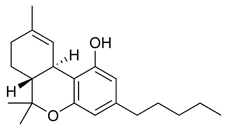Business Editors, Health/Medical Writers
SAN CARLOS, Calif.--(BUSINESS WIRE)--Feb. 26, 2002
Unimed Pharmaceuticals, Inc., a wholly owned subsidiary of Solvay Pharmaceuticals, Inc., and Inhale Therapeutic Systems, Inc. (Nasdaq:INHL) today announced that they have entered into a collaboration to develop a metered dose inhaler (MDI) of dronabinol (synthetic delta-9-tetrahydrocannabinol) to be used for multiple indications.
Dronabinol is the active ingredient in Unimed Pharmaceuticals' product MARINOL(R) Capsules. MARINOL(R) Capsules is synthetic delta-9-tetrahydrocannabinol. MARINOL(R) is approved in the US and is indicated for the treatment of anorexia associated with weight loss in patients with AIDS and for the treatment of refractory nausea and vomiting associated with cancer chemotherapy.
"We are pleased that Unimed will be partnering with us to develop this inhaleable dronabinol, as they have the history and knowledge with this product and its patient base," said Ajit Gill, president and CEO of Inhale. "This will be our first MDI development program and is the third inhaleables development program we have signed in the last five months. We believe that Unimed's decision to partner with Inhale is an endorsement of the breadth of our Inhance(TM) pulmonary delivery platform and Inhale's expertise in the inhaleables field."
"Inhale has a great deal of expertise in the development of aerosol medicine," said Jean-Louis Anspach, president and chief executive officer of Unimed. "They have developed a range of products that include inhaleable proteins and small molecules using a variety of drug processing and delivery devices. We are confident that they will help us develop the most appropriate product to bring to market in the least amount of time."
Under the terms of the collaboration, Inhale will be responsible for development of the formulation, as well as clinical and commercial manufacturing of the drug formulation and inhaler combination. Unimed, a wholly owned and independently operated subsidiary of Solvay Pharmaceuticals, Inc., will be responsible for the clinical development and worldwide commercialization of the system. Inhale will receive research and development funding, milestone payments as the program progresses through further clinical testing, and royalty payments and manufacturing revenues when the product is commercialized.
Unimed Pharmaceuticals, Inc., (www.unimed.com) a wholly owned, independently operated subsidiary of Solvay Pharmaceuticals, Inc., focuses on drugs with multiple indications in the therapeutic areas of men's health (urology and endocrinology) and certain infectious diseases. Unimed Pharmaceuticals, based in the Chicago, Illinois area, has expertise in ethical drug development.
Solvay Pharmaceuticals, Inc. (www.solvaypharmaceuticals-us.com) of Marietta, Georgia, is a research-based pharmaceutical company, active in the therapeutic areas of cardiology, gastroenterology, mental health and women's health. It is a member of the worldwide Solvay S.A. chemical and pharmaceutical group, headquartered in Brussels, Belgium.
Inhale Therapeutic Systems, Inc., provides a portfolio of leading performance-enabling drug delivery technologies and expertise to help pharmaceutical and biotechnology companies maximize the performance of their compounds. Inhale offers three leading drug delivery platforms: a suite of technologies for the inhaleable delivery of macromolecules and small molecules for systemic and local lung delivery; supercritical fluid powder particle engineering to easily control particle size for a variety of drug delivery applications; and PEGylation for enhanced delivery performance of most major drug classes. The company is collaborating with major pharmaceutical and biotechnology companies, including Amgen, AstraZeneca, Aventis Behring, Bristol-Myers Squibb, Chiron, Enzon, GlaxoSmithKline, Johnson & Johnson, Lilly, Pfizer, Pharmacia, Roche, Schering-Plough and Serono.
This release contains forward-looking statements that reflect the current views of Inhale management as to future products, product development, and other future events and operations. These forward-looking statements involve uncertainties and other risks that are detailed in reports and other filings with the Securities and Exchange Commission, including Forms 10-K as amended for 2000. These documents identify important factors that could cause the companies' actual performance to differ from current expectations, including the outcome of clinical trials, regulatory review, manufacturing capabilities and marketing effectiveness.
COPYRIGHT 2002 Business Wire
COPYRIGHT 2002 Gale Group



